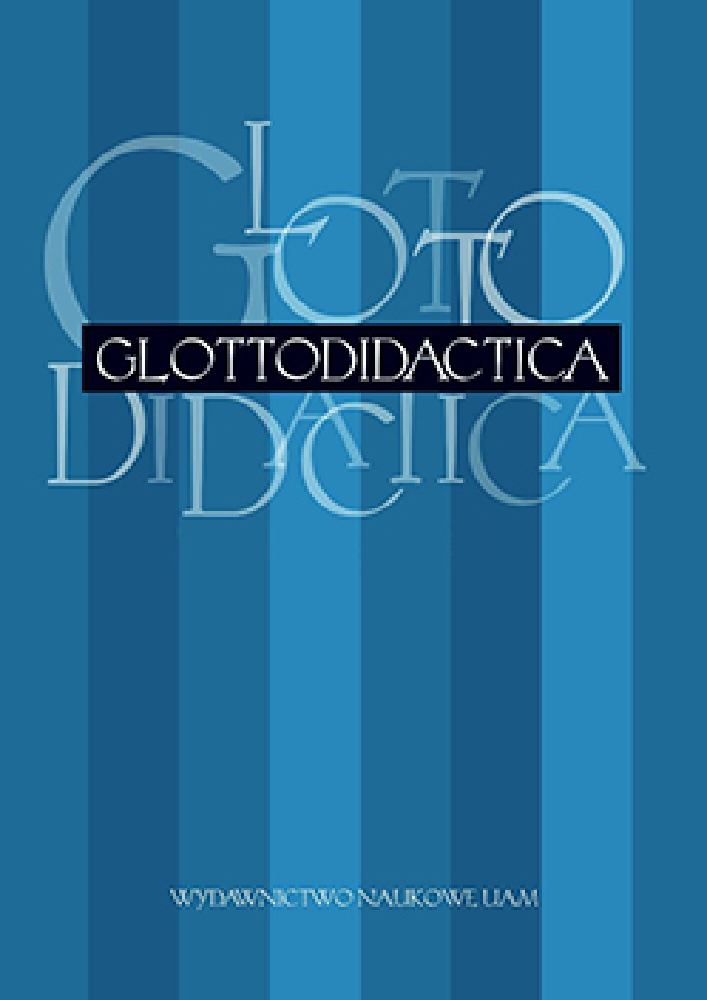Abstract
The article introduces different approaches to (self-)awareness, as presented in this issue of Glottodidactica. Its first part discusses the advantages of developing (self-)awareness – in relation to the foreign language teacher and the foreign language learner. The general concept of savoir-être competence (existential competence) is also mentioned. In the second part possible research perspectives in this area and examples of research are given. The third part lists techniques and tools which can be used to stimulate teacher and student self-awareness.
Literaturhinweise
Atienza, I. (2003). L’émergence de l’inconscient dans l’appropriation des langues étrangères. Éla. Études de linguistique appliquée, 3 (131), 305–328.
Bouvier, B. (2003). Chinois et français : quand les habitudes culturelles d’apprentissage s’opposent. Éla. Études de linguistique appliquée, 4 (132), 399–414.
Branden, N. (1994). The six pillars of self-esteem. New York : Bantam.
Brewer, S.S. (2008). Rencontre avec Albert Bandura : l’homme et le scientifique. L'orientation scolaire et professionnelle, 37 (1), 29–56. DOI : https://doi.org/10.4000/osp.1596.
Earley, C.P. / Ang, S. (2003). Cultural intelligence : Individual interactions across cultures. Stanford : Stanford University Press.
Galisson, R. / Puren, C. (2001). La formation en questions. Paris : Clé International.
Huot, D. / Schmidt, R. (1996). Conscience et activité métalinguistique. Quelques points de rencontre. Acquisition et interaction en langue étrangère, 8, 89–127.
Muller, C. (2021). « Je commence à devenir plus cool » : retours d’enseignants de langue débutants sur leur imaginaire professoral. Recherches en didactique des langues et des cultures, 18 (2). http://journals.openedition.org/rdlc/9468 [accès : 10.10.2021].
Narcy-Combes, J.-P. (2019). Comment la réflexion sur le transculturing conduit à repenser la compétence interculturelle. Neofilolog, 52 (2), 353–371.
Peris, E.M. (2009). L’éducation pour l’autonomie : un nouveau modèle d’enseignement? In : M.-L. Lions-Olivieri / P. Liria (dir.), L’approche actionnelle dans l’enseignement des langues. Onze articles pour mieux comprendre et faire le point (p. 101–118). Barcelone : Difusión – Maison des Langues.
Pogranova, S. / Brauchli, B. / Elmiger, D. (2017). Représentations sociales de la réussite d’une leçon de langue. EDL Études en Didactique des Langues, 28, 97–112.
Ricœur, P. (1985). Temps et récit. T. 3. Le temps raconté. Paris : Le Seuil.
Rogers, C.R. (1961). On becoming a person. A therapist’s view of psychotherapy. New York : Houghton Mifflin.
Roussel, S. / Gaonac’h, D. (2017). L’apprentissage des langues. Mythes et réalités. Paris : Retz.
Smuk, M. (2014). Le savoir-être de l’apprenant au service du processus d’autonomisation. Synergies Chine, 9, 41–51.
Smuk, M. (2016). Od cech osobowości do kompetencji savoir-être – rozwijanie samoświadomości w nauce języków obcych [From personality traits to the savoir-être competence : the development of self-awareness in foreign language teaching / learning]. Lublin–Warszawa : Wydawnictwo Werset – Instytut Romanistyki Uniwersytetu Warszawskiego.
Smuk, M. (2017). Construire son identité dans les récits autonarratifs – cas des apprenants en langue. In : D. Elmiger / I. Racine / F. Zay (dir.), Bulletin suisse de linguistique appliquée (VALS-ASLA), n˚ spécial 2017. Processus de différenciation : des pratiques langagières à leur interprétation sociale (t. 2, p. 195–204). Neuchâtel : Centre de linguistique appliquée de l’Université de Neuchâtel.
Smuk, M. (2018). Compétence de savoir-être dans l’apprentissage des langues. Redéfinitions, applications, défis. Glottodidactica. An International Journal of Applied Linguistics, XLV (1), 133–146.
Smuk, M. (2020). Barrières dans l’apprentissage du FLE aux yeux des étudiants polonophones. In : F. Kakoyianni-Doa et al. (dir.), Langues moins Diffusées et moins Enseignées (MoDiMEs). Langues enseignées, langues des apprenants / Less Widely Used and Less Taught Languages. Language learners’ L1s and languages taught as L2s. Bruxelles–Bern–Berlin–New York–Oxford–Wien : P.I.E. Peter Lang, 83–96.
Smuk, M. (2021). Identifier et affronter les théories subjectives sur l’enseignement / apprentissage des langues, In : N. Sorba (dir.), Transmettre les langues : pourquoi et comment? Les défis pédagogiques. Louvain-la-Neuve : EME Éditions, 267–283.
Starościak, K. (2016). Culture éducative et construction des représentations de l’aspect grammatical en langue étrangère : stratégies des polonophones apprenant le français en milieu formel. Neofilolog, 47 (2), 243–258.
Szymankiewicz, K. (2016). Former à l’enseignement interculturel : le rôle du savoir-être et du savoir-apprendre des futurs enseignants de langue étrangère. Actas del Tercer Congreso Internacional en Lingüística Aplicada a la Enseñanza de Lenguas : En camino hacia el plurilingüismo, 260–269.
Thibodeau, S. / Giguère, E. / Lefebvre, S. / Frenette, E. (2021). Estime de soi, sentiment d’autoefficacité et intention de décrocher au collégial. Revue internationale de pédagogie de l’enseignement supérieur, 37 (3). DOI : https://doi.org/10.4000/ripes.3359.
Lizenz
 This work is licensed under a Creative Commons Attribution-NoDerivatives 4.0 International License.
This work is licensed under a Creative Commons Attribution-NoDerivatives 4.0 International License.
Authors
Authors of texts accepted for publication in Glottodidactica are required to complete, sign and return to the Editorial team’s office the Agreement for granting a royalty-free license to works with a commitment to grant a CC sub-license.
Under the agreement, the authors of the texts published in Glottodidactica grant Adam Mickiewicz University in Poznań a non-exclusive, royalty-free license and authorize the use of Attribution-NoDerivatives 4.0 International (CC BY-ND 4.0) Creative Commons sub-license.
The authors retain the right to the free disposal of the work.
Users
Interested Internet users are entitled to use works that have been published in Glottodidactica since 2016, under the following conditions:
▪ attribution – obligation to provide, together with the distributed work, information about the authorship, title, source (link to the original work, DOI) and the license itself.
▪ no derivatives – the work must be preserved in its original form. Without the author's consent, it is not possible to distribute the modified work in the form of translations, publications, etc.
Copyrights are reserved for all texts published before 2016.
Miscellaneous
Adam Mickiewicz University in Poznań retains the property right as a whole (layout, graphic form, title, cover design, logo etc.).
Privacy statement
The names and email addresses published on this journal site will be used exclusively for the purposes declared by this journal and cannot be used for any other purpose or by any other party.





